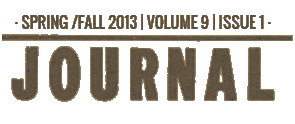· SPRING /FALL 2013 | VOLUME 9 | ISSUE 1 ·
Rougarou, an online literary journal.
God Bless America
By Steve Almond. (Wilmington: Lookout Books, 2011. 211 pages, $17.95). ISBN 978-0-9845922-3-4
In his first collection since 2005’s The Evil B.B. Chow and his first book since 2010’s Rock and Roll Will Save Your Life, Steve Almond’s God Bless America brings readers thirteen stories previously published in a variety of magazines that, like all of his previous work, radiate equal parts surface humor and life-affirming depth.
One of the strongest and most consistent aspects of Almond’s stories is his attention to detail that would be overlooked by casual life observers. Almond shapes worlds through minute aspects of existence that lend concreteness and verisimilitude to his stories. He then offers innovative and interesting descriptions of those details to further enhance the reader’s experience. In “Hope Wood,” a painter uses “the high-gloss exterior stuff from little cans” for his art; later the narrator is staring across the street at a warehouse that “was coming apart in crinkled sheets, tin or something cheaper than tin” (40). In “Not Until You Say Yes,” the scheming and brash Kenneth has “bulky braces, as if he were sucking on a bullet” (58). Descriptions like these are spread throughout the prose much like the various card hands played in his story “Donkey Greedy, Donkey Gets Punched.” Almond’s details, however, are never hidden, but face-up for all to observe.
Almond’s largest fault in this collection is his lack of faith in the reader to make conclusions. For example, the title story’s main character, Billy Clamm, becomes employed by a duck boat company that puts on Tea Party reenactments, a business which acts as a front for drug-running. Near the end, Clamm is in a dinghy collecting the “tea boxes” when the police come, begin arresting his coworkers, and then turn to begin firing at him. He escapes into Boston Harbor, where he opens one of the bags to find “a little white vacuum-packed brick”; he thinks it may be flour or baby powder, then takes a taste. Gums tingling, Clamm continues to drift “in possession of approximately seven pounds of cocaine” (14). A second example of such superfluous clarification stands out in “Tamalpais,” wherein readers are given a synopsis of a legend of a love-sick woman, while learning that the woman in the present moment is also lovesick and delusional. In the penultimate paragraph Almond writes, “up above, Charlotte might only have been a lovesick maiden sleeping peacefully on a mountain” (103). Stating such connections and conclusions that every part of the story implies might project an air of intellectual hubris that could be easily avoided.
Reading through God Bless America also suggests that Almond is a stronger writer when portraying a male’s perspective. Where readers are given insight into the male mind and given a privileged view of the inner workings of the narrators in this collection, they are left watching the female narrators from a distance. As in the story “Not Until You Say Yes, ”Almond leaves readers to draw their own conclusions about the female mind, which is, ironically, a technique that would do him better service elsewhere in the collection.
However, Almond has perfected the voice and close narration of recent liberal arts school graduates with little direction. He harnesses humor to daily utterances, portraying dialogue that might be trite in the hands of a less skilled author; he manages to create worlds where lines like “his costume, which Pop claimed made him look like a homosexual pirate,” and “What do you call this look? Freud gets gangbanged by Ikea?”are funny and believable, not excessive (6; 12). Almond balances his humor with excellently crafted images of human pain and collapse: Gary Sharpe, a poker player in “Donkey Greedy, Donkey Gets Punched” discusses his position on gambling by saying “That’s not gambling, it’s Disneyland. Gambling is about people ruining their fucking lives” (24).
Overall, God Bless America stands as a solid addition to Almond’s oeuvre, reinforcing the traits for which he is already known, and which one could argue he has already perfected.
STEVE SLAUGHTER
Stetson University







